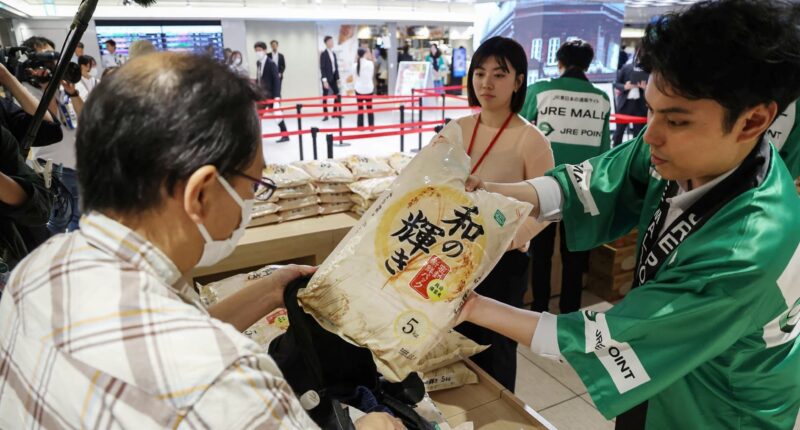Share this @internewscast.com
A supply of government-stored rice, delivered by the high-speed “shinkansen” bullet train, was distributed to individuals who had pre-ordered it at Tokyo Station on June 10, 2025.
Str | Afp | Getty Images
In September, Japan experienced a rise in its core inflation rate, reaching 2.9%. This marked the first uptick since May and met the predictions of economists surveyed by Reuters.
This figure surpassed the 2.7% recorded in August. Japan’s core inflation index excludes fresh food prices but includes energy costs.
Overall inflation in Japan also increased to 2.9%, up from 2.7% in the previous month, surpassing the Bank of Japan’s target of 2%.
Meanwhile, the “core-core” inflation rate, which excludes both fresh food and energy costs and is a key focus for the Bank of Japan, decreased to 3% from 3.3% in August.
Rice inflation, which drew headlines earlier this year, eased sharply to 49.2%, down from 69.7% the previous month. In May, rice inflation hit 101.7%, the highest level in over 50 years.
Japan’s Nikkei 225 was 0.78% up after the decision, while the yen strengthened marginally to trade at 152.53 against the dollar.

The data comes as Japan sees a new prime minister in Sanae Takaichi, who inherits an economy beset by trade uncertainties, cost-of-living worries, and a central bank determined to raise interest rates and normalize monetary policy.
Inflation will be a major bugbear for Takaichi to tackle, experts previously told CNBC. Japan has a large population of retirees drawing pensions and those on a fixed income, making inflation “very painful” for them, Tomohiko Taniguchi, Special Advisor at the Fujitsu Future Studies Center, told CNBC’s “Squawk Box Asia” on Oct 13.
“How to tackle inflation is going to be the first litmus test to judge whether Takaichi could deliver a policy package,” Taniguchi said.
Headline inflation has been above the BOJ’s target for 41 straight months, a run stretching back to April 2022.
Jesper Koll, expert director at financial services firm Monex Group told CNBC on Wednesday after Takaichi took power that “if inflation in Japan is still is not below 2% in six to nine months time, the popularity of this cabinet is going to plummet because [to] the Japanese people… the number one, number two, number three concern is inflation.”
Takaichi was reportedly planning an economic stimulus package of more than 13.9 trillion yen ($92.19 billion) to help households cope with inflation, investment in growth industries, and national security, Reuters reported on Oct. 22. The package could be announced as early as next month.








